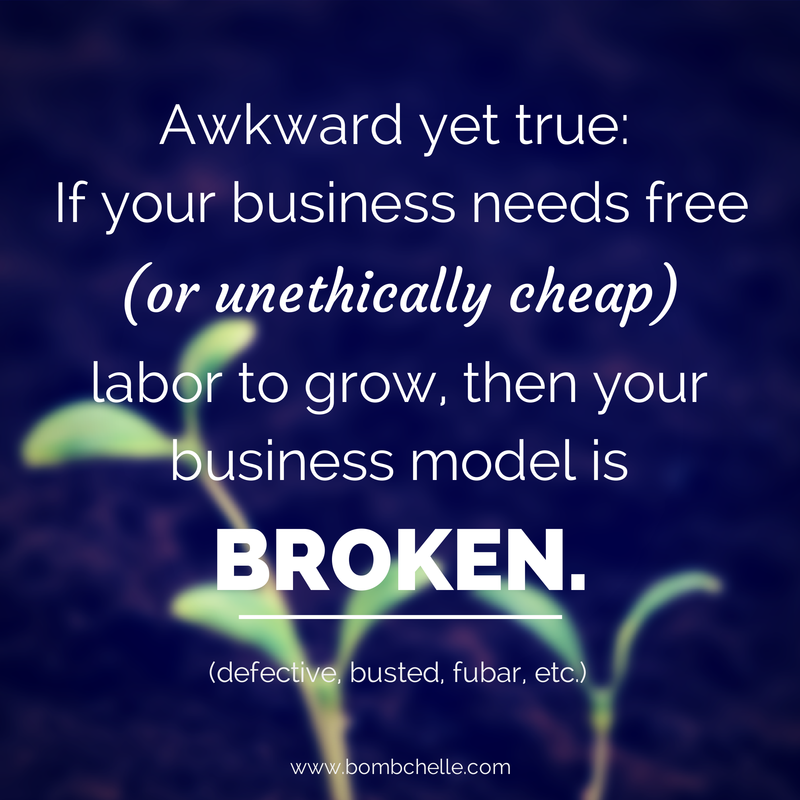
Today I’m beating the business community’s favorite dead horse: working for free.
TL;DR: Never try to get free work from people. And don’t work for free. Except for on rare occasions, when you actively choose to. Confused? It’ll all become clear:

Uncomfortable truth #1: If your business needs free labor to grow, your business model is broken.
If you, as a business owner, need someone consistently working for you (I’m not talking about a one-off service trade, I’m talking about 10+ hours a week, every week) at a rate that doesn’t even cover their basic necessities, then one of two things is happening:
- You don’t really need them working at that low of a rate. You just don’t want to take a cut to your own payment or your profit margins while they learn the ropes – which is what a good leader would do. If you don’t believe in your business enough to take a pay cut for it, why should someone else?
- Your business model is fundamentally broken. Period, full stop.
I see a lot – a lot – a painful amount, really – of people posting contractor positions that require an ungodly amount of skills, talents, and experience, and the expected pay is $10-15/hour. When called on it, sometimes they cite tight budgets, sometimes they just get belligerent and say it’s better than minimum wage.
But that rate, for a non-employee, is effectively minimum wage (or lower), because after taxes, insurance, and work expenses are taken out, you’re looking at roughly half the hourly rate (maybe a little more), which translates to a take-home pay of $5-10 an hour. For an educated, skilled worker.

(Not to mention that a lot of these postings actually cross over into employee status – see this post for more info. Also, read this post on interns, because unpaid interns are another pet peeve of mine. This also doesn’t even touch on the fact that minimum wage, for most areas of the country, isn’t a livable wage in the least, but that’s a whole ‘nother ballgame for a whole other stadium.)
I recently listened to a great interview with Simon Sinek (the “Start With Why” dude) where he talks about leadership styles. He mentions Jack Welch, CEO of GE, who is apparently a Wall Street business idol (and sounds like kind of a douchebag). He contrasted Welch’s leadership style (cut the “bottom” 10-20% of employees every year, whether their performance over the last several years had been good or not, generally putting a lot of pressure on employees, etc.) with the leadership style of James Sinegal (former CEO of Costco).
Costco is well-known for their stance that the minimum wage should be increased, and its average employee pay is $21/hr – almost three times the federal minimum wage. Sinegal was often criticized by Wall Street for putting good treatment of employees & customers ahead of pleasing shareholders, and his whole management style was based around the belief that treating employees well creates a culture where customers are treated well – thus, business growth.
The kicker? During Welch’s tenure, GE’s value rose 4,000%; during Sinegal’s tenure, Costco’s value increased by 5,000%. Proof that ethical business can pay off.
If you need to hire someone to grow your business: pay them an ethical rate, take a pay cut in the meantime if necessary, and train them to bring more money into your business. If you can’t do that, you need to evaluate your business model, because something needs to be fixed.
Uncomfortable truth #2: If you don’t have time/energy for marketing, your business model is broken.
One of the common contributors to the “I can’t pay, but…” phenomenon are sites looking for regular (read: weekly or more) contributors. They say you’ll get exposure by writing for them, and that should be payment enough, thank you!
Two pertinent facts:
- At least 95% of the people who approach you (or are actively sourcing workers) and say “we can’t pay but…” or “we can’t pay much, but…” are going to be huge honking pains in your ass until you get frustrated and give up.
- I have had some actually-converting-to-mo-sales-mo-money exposure that’s come from essentially working for free.
The freelancer-slash-self-employed community loves to condemn working for exposure. And it’s totally valid. Especially because, as mentioned, people who have that attitude are almost always entitled assholes. I would certainly neverever tell someone who was a graphic designer to design things for free, or tell a web developer to code a whole site from the ground up, all in the name of exposure.
But here’s the catch: marketing, done right, is essentially working for free.
Good marketing gives people a taste of what you have to offer and how you can improve their lives. It takes time. And energy. Illana spends what must be hours a week in her Facebook group (sign up on the sidebar here to get access). Halley does the same thing with her group. I have no doubt that their time has a measurable ROI (the main reason I decided to work with Illana was because of her group), but they’re still doing some free consulting every week – every day, really – in those groups.
Sometimes, the lines between “marketing” and “free work” are blurry. And sometimes, we’re so jaded by all the assholes looking for free work, that we refuse to do anything remotely resembling free work, even if it’s actually marketing.
Which is where this issue intersects with the “your business model is broken” issue.
I’ve heard people sniff dismissively and say, “I don’t have time to do free work [i.e. marketing] – I need to be working on things that put money in my hand!” That mindset is what keeps freelancers stuck in the feast or famine cycle. If you literally do not have the time in your day to market yourself and still meet your income goals, then you need to raise your rates, because marketing is a part of being a business owner and/or freelancer, whether you like it or not.
I’m a writer by trade. It’s what I do. I could easily view writing guest posts as working for free, but I do it anyways – because I categorize it as marketing and I see very clear, tangible benefits as a result of my work there.
This post has already resulted in paying work (not even three weeks later) and having written at FastCompany is a huge credibility booster that I’m fairly certain has been the tipping point in another two or three clients deciding to work with me (again, not even three weeks later).
When it comes to marketing, look for your highest leverage activities, and do what feels good.
(More often than not, those two are the same.)
If you have less-than-no interest in marketing yourself, you’re honestly (and I say this without snark) better off getting a job – whether that’s remote work as a full time employee or being a full-time contractor (just make sure you’re actually a contractor, and not an employee – here’s that useful rundown again). But whatever you do, please don’t look at a marketing opportunity and pooh-pooh it as working for free, and don’t encourage others to do the same.
If you’re ready to come up with a marketing plan that incorporates a results-getting guest post strategy, check out the class that starts July 21. If you’re curious about guest posting as a marketing tactic and want to learn more, keep checking back – I’ve got two more posts queued up for ya!
